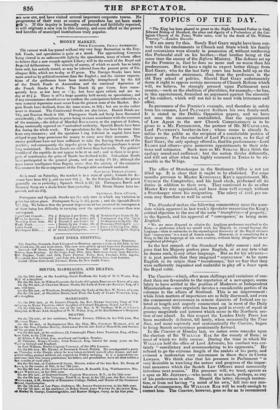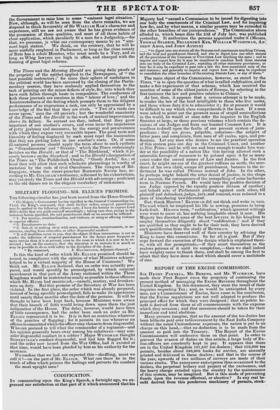The Courier—which, after more shiftings and variations of con- duct
than are favourable to the reputation of a newspaper, seems lately to have settled in the position of Moderate or Independent Ministerialism—now regularly devotes a considerable portion of its columns to the affairs of Scotland. This is an improvement : while Irish matters of importance are so fully discussed, and even the commonest occurrences in remote districts of Ireland are re- lated at length and eagerly commented on in most of the Daily Journals, very little attention has been paid to events of equal or greater magnitude and interest which occur in the Northern sec- tion of our island. In this respect the London Daily Press has been manifestly deficient, till lately, when occasionally the True Sun, and more copiously and systematically the Courier, began to bring Scotch occurrences prominently forward. In the Courier of Monday last, we notice some remarks upon the election of Sir WILLIAM RAE for the county of Bute; in most of which we fully concur. During the time in which Sir WILLIAM held the office of Lord Advocate, his conduct was cer- tainly " conciliatory and accommodating to his opponents." He refused to go the extreme length of the zealots of his party, and evinced a moderation very uncommon in those days in Crown Lawyers. We think also that his presence in Parliament " is very desirable in watching the nature and progress of the impor- tant measures which the Scotch Law Officers must necessarily introduce next session." His presence will, we trust, operate as a spur on Mr. JEFFREY who needs it as much, perhaps, as any Of his predecessors in office. Should the latter, through inatten- tion, or from not having "a mind of his own," fall into any mis- takes of consequence, Sir WILLIAM RAE will be ready enough to correct him. The Courier, however, goes so far IQ to recommend the Government to raise him to some "eminent legal situation." Now, although, as will,be seen from the above remarks, we are disposed to think favourably of Sir WILLIAM RAE'S character and experience, still we are not aware that he has given evidence of the possession of those qualities, and most of all those habits of close application, which peculiarly fit a man for a Judgeship,—for that, we presume, is what our contemporary means by an "emi- nent legal station." We think, on the contrary, that he will be more usefully employed in Parliament, so long as the close county of Bute has a whole Member, who must needs be a Tory, and so long as Whig lawyers are high in office, and charged with the framing of great legal reforms.

















 Previous page
Previous page